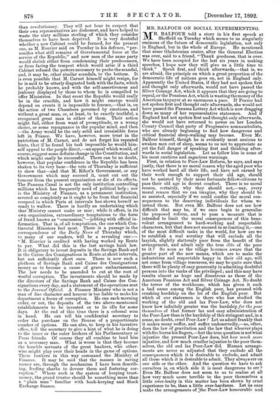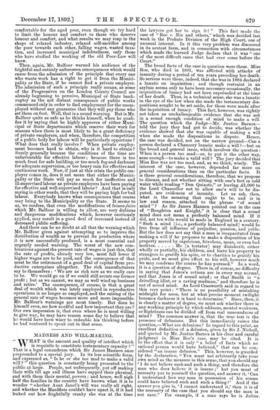MR. BALFOUR ON SOCIAL EXPERTMRNTING.
MR. BALFOUR told a story in his first speech at Sheffield on Tuesday which seems to us singularly ominous of the future of democratic legislation, not only in England, but in the whole of Europe. He mentioned that some Gladstonian orator, after the General Election was over, said to a friend, " Thank goodness, that is over. We have been occupied for the last six years in making speeches, I hope now they will give us a little time to think." Speak first, and think afterwards,—that is, we are afraid, the principle on which a great proportion of the democratic life of nations goes on, not in England only. Apparently the United States, if they had not spoken first and thought only afterwards, would not have passed the Silver Coinage Act, which it appears that they are going to repeal, or the Pensions Act, which is wasting the money of the American taxpayer at so enormous a pace. If France had not spoken first and thought only afterwards, she would not have passed the Panama Lottery Act which is now dragging down so many of her representative statesmen. And if England had not spoken first and thought only afterwards, she would not have returned to power on her London County Council that party of Progressive somnambulists, who are already beginning to find how dangerous and critical financial sleep-walking may become. Even Mr. Balfour himself, though he is evidently most anxious to awaken men out of sleep, seems to us not to appreciate as yet the full danger of speaking first and thinking after- wards in social legislation. Let us follow him in some of his most cautious and sagacious warnings. First, in relation to Poor-Law Reform, he says, and says justly, that there is no moral reason why the aged poor who have worked hard all their life, and have not earned by their work enough to support their old age, should not be assisted by their more fortunate fellow-citizens to pass their old age in decent comfort. There is no moral reason, certainly, why they should not, —nay, every moral reason that we can imagine, why they should be so assisted, especially if we could confine the moral con- sequences to the deserving individuals for whom we intend them. But even Mr. Balfour does not see how difficult that may be, if we once begin to generalise the proposed reform, and to pass a measure that is intended to limit the moral consequences of this bene- volent arrangement to hard-working and respectable characters, but that does not succeed in so limiting it,—one of the most difficult tasks in the world, for how are we to establish a real scrutiny that will exclude all the lazyish, slightly slatternly poor from the benefit of the arrangement, and admit only the true elite of the poor to it ? So soon as the village becomes aware that the greater part of the new means, which are to make the industrious and respectable happy in their old age, will not come from village resources, we may be quite sure that there will be plenty of easy generosity in admitting doubtful persons into the ranks of the privileged; and this may have results almost as huge and disastrous as those of the American Pensions Act and Silver Coinage Act. No doubt the terror of the workhouse, which has given it such a bad name among the English poor, has pressed with crushing hardship on the lot of the English poor. But which of our statesmen is there who has studied the working of the old and lax Poor-Law, who does not know how infinitely greater was the hardship for the poor themselves of that former lax and easy administration of the Poor-Law than is the hardship of this stringent and, in a sense, no doubt, cruel Poor-Law ? Let us admit frankly that it makes many suffer, and suffer undeservedly,—so, often, does the law of gravitation and the law that whoever plays with fire burns his fingers,—but the true question is not what injustice the present Poor-Law does, but how much more injustice, and how much crueller injustice to the poor them- selves, the old and lax Poor-Law did. Human arrange- ments are never so adjusted that they exclude all the consequences which it is desirable to exclude, and admit all those which it is desirable to admit. They always err on one side or the other. And the question we have to ask ourselves is, on which side it is most dangerous to err ? Even Mr. Balfour does not seem to us to realise at all how very much more terrible to the poor themselves a little over-lenity in this matter has been shown by cruel experience to be, than a little over-hardness. Let us once make the arrangements of the Poor-Law honourable and comfortable for the aged poor, even though we try hard to limit the honour and comfort to those who deserve honour and comfort, and what results we may reap in the shape of relaxed industry, relaxed self-sacrifice among the poor towards each other, falling wages, wasted taxa- tion, and increased municipal indebtedness, only those who have studied the working of the old Poor-Law will know.
Then, again, Mr. Balfour warned his audience of the frightful and entirely unforeseen consequences which would ensue from the admission of the principle that every one who wants work has a right to get it from the Munici- pality or the State, if he cannot find a private employer. The admission of such a principle really means, as some of the Progressives on the London County Council are already beginning to perceive, Municipal or State bank- ruptcy as the not distant consequence of public works commenced only in order to find employment for the unem- ployed without any guarantee that they will pay those who set them on foot. Well, that is a sound warning. But is Mr. Balfour quite as safe as he thinks himself, when he quali- fies it by saying that he highly approves of either Muni- cipal or State departments which reserve their work for seasons when there is most likely to be a great deficiency of private employers, and when, therefore, the competition of a public body for labour will be particularly opportune ? What does that really involve ? When private employ- ment becomes hard to obtain, why is it hard to obtain ? Surely generally because the conditions of the time are unfavourable for effective labour ; because there is too much frost for- safe building, or too much fog and darkness for adequate supervision, or too heavy rain for effective and continuous work. Now, if just at this crisis the public em- ployer comes in, does it not mean that either the Munici- pality or the State will pay as much for ineffective and ill-supervised labour as private employers have been paying for effective and well-supervised labour? And that is only saying in other words, that they will be paying high for bad labour. Everybody knows what consequences that course may bring to the Municipality or the State. It seems to us we confess, that even the modifications of laissez-faire wiich Mr. Balfour is willing to allow, are very dubious and dangerous modifications which, however cautiously applied, may result in a good deal of increased instead of decreased public suffering. And there can be no doubt at all that the warning which Mr. Balfour gives against attempting so to improve the distribution of wealth as to prevent its production where it is now successfully produced, is a most essential and urgently needed warning. The worst of the new com- binations against the present rate of wages is just this, that the rate of profits, already very low, must fall lower if higher wages are to be paid, and the consequence of that must be the retirement of a good deal of capital from pro- ductive enterprises altogether. The rich manufacturers say to themselves : We are as rich now as we really care to. be. We would go on if we could still secure our former profit ; but as we cannot, we may as well wind up business and retire.' The consequence, of course, is that a great deal of wealth which was lately employed in reproductive operations is no longer so employed, and the raising of the general rate of wages becomes more and more impossible. Mr. Balfour's warnings are most timely. But does he himself even, see how needful and how important they are ? Our own impression iS, that even where he is most willing to give way, he may have reason some day to believe that he would have been wiser to redouble his thinking before he had ventured to speak out in that sense.







































 Previous page
Previous page